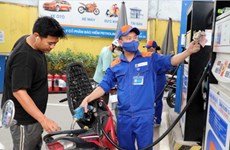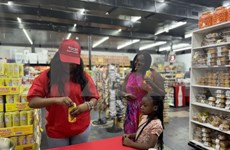HSBC: Vietnamese currency more stable in 2012
Vietnamese currency will be relatively more stable in 2012, the Hongkong
and Shanghai Banking Corporation (HSBC) said in its report on the 2012
outlook on Vietnam’s economy, which was announced on Feb. 20.
Vietnamese currency will be relatively more stable in 2012, the Hongkong
and Shanghai Banking Corporation (HSBC) said in its report on the 2012
outlook on Vietnam’s economy, which was announced on Feb. 20.
The bank said that Vietnam ’s 2011 growth rate, although impressive at 5.9 percent, stood at a post-2000 low (excluding 2009 financial crisis related growth of 5.3 percent).
While this partly reflected a weakening global environment, domestic conditions were just as much to blame. Inflation was high, rising 18.6 percent year-on-year in 2011. Rising prices and measures to curb them took their toll on the economy, both in the short and long term.
However, macro-economic conditions have stabilised since the turbulent days of early 2011. Inflation decreased to 17.3 percent year-on-year in January, and HSBC expects it to hit single digits by the end of 2012.
Even the dong (VND) has stabilised and a one-off devaluation is no longer priced in. This is thanks to efforts by the State Bank of Vietnam (SBV) to gradually weaken the VND and dampen demand for imports. More encouragingly, after much talk, banking reforms are materialising: three banks merged recently and more are expected to follow suit in 2012.
In contrast to 2011, which began with a sharp weakening of the currency, high inflation, and several tightening measures, HSBC believes 2012 will be relatively stable. Several factors should contribute to this trend: slower inflation, better management of macro-economic policy by the Governor of the SBV, and improved trade and fiscal positions.
The trade deficit is expected to stabilise at 10 billion USD in 2012 (versus 9.8 billion USD in 2011) and the consolidated Government balance is expected to decelerate to 3.8 percent in 2012 from 3.9 percent in 2011.
The dong has stabilised in recent months. Historically, the VND had come under a lot of pressure during the Lunar New Year due to stronger demand for USD. This reflected a rush towards the end of the year to pay for dollar-denominated loans, with higher demand for imports during Tet. For several reasons, this did not happen in 2011.-VNA
The bank said that Vietnam ’s 2011 growth rate, although impressive at 5.9 percent, stood at a post-2000 low (excluding 2009 financial crisis related growth of 5.3 percent).
While this partly reflected a weakening global environment, domestic conditions were just as much to blame. Inflation was high, rising 18.6 percent year-on-year in 2011. Rising prices and measures to curb them took their toll on the economy, both in the short and long term.
However, macro-economic conditions have stabilised since the turbulent days of early 2011. Inflation decreased to 17.3 percent year-on-year in January, and HSBC expects it to hit single digits by the end of 2012.
Even the dong (VND) has stabilised and a one-off devaluation is no longer priced in. This is thanks to efforts by the State Bank of Vietnam (SBV) to gradually weaken the VND and dampen demand for imports. More encouragingly, after much talk, banking reforms are materialising: three banks merged recently and more are expected to follow suit in 2012.
In contrast to 2011, which began with a sharp weakening of the currency, high inflation, and several tightening measures, HSBC believes 2012 will be relatively stable. Several factors should contribute to this trend: slower inflation, better management of macro-economic policy by the Governor of the SBV, and improved trade and fiscal positions.
The trade deficit is expected to stabilise at 10 billion USD in 2012 (versus 9.8 billion USD in 2011) and the consolidated Government balance is expected to decelerate to 3.8 percent in 2012 from 3.9 percent in 2011.
The dong has stabilised in recent months. Historically, the VND had come under a lot of pressure during the Lunar New Year due to stronger demand for USD. This reflected a rush towards the end of the year to pay for dollar-denominated loans, with higher demand for imports during Tet. For several reasons, this did not happen in 2011.-VNA












